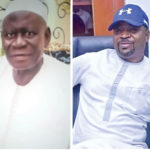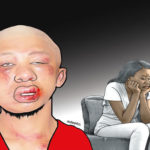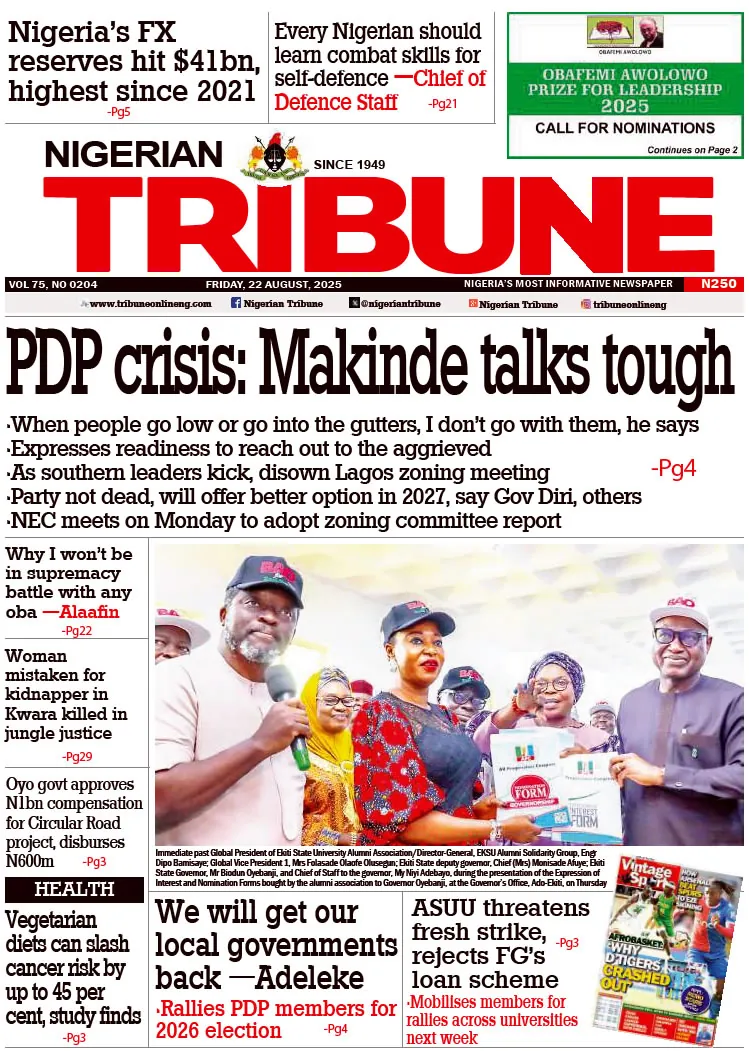Renowned publisher and newspaper columnist, Dele Momodu, has formally informed the Peoples Democratic Party (PDP) of his intention to vie for its presidential ticket in the 2023 election. He spoke to journalists after a meeting with the national chairman of the main opposition party, Dr Iyorchia Ayu, at the party’s national secretariat in Abuja. LEON USIGBE brings excerpts from the interview.
What was your mission at the PDP national secretariat?
I have just met with the national chairman of our great party, Dr Iyorchia Ayu, in his office. And my mission here was to present him with a letter of my decision to run the presidential race. As you are probably aware, I was a contestant in 2011 on the platform of the National Conscience Party. Today, I am a member of the PDP, a very proud one at that. PDP is the leading opposition political party in Nigeria today and one of the biggest political parties in Africa.
A number of persons would contest the primaries of the PDP. Would you accept any consensus arrangement like it was done in the last convention?
Nothing is impossible. The job of any aspirant is to show his capacity to win election. Nobody is going to hand it to you on a silver platter. The reason they had a consensus was because everybody agreed that the chairmanship candidacy of Dr Iyorchia Ayu was the best for the party at that time. So, I am sure that it is also possible that when that time comes, the party will come together because all of us would have gone round and been able to demonstrate our capacities to the people. And I am very sure that I am very ready. You don’t wake up and say ‘I want to be president of Nigeria’. It is a very big country. So, you have to look at people’s antecedents, where they are coming from. And I am very certain about this with every sense of modesty: there is no candidate that will be better than me.
When you said the party should not follow the previous considerations in the choice of who represents them? What does that mean? Are you saying that the party should not consider zoning?
I haven’t said anything about zoning. The party elders would decide how it should go, whether zoning or no zoning. The mood in the country today, as far as I know, is that power should come to the south. If you look at it, President [Olusegun] Obasanjo left in 2007 and then you had the like of Alhaji Umaru Musa Yar’Adua who died and then Dr Goodluck Jonathan came in. And since then, we have had [Muhammadu] Buhari. And by the grace of God, we will have had him for eight years by 2023. And the country is in total disarray. You have people agitating in the South East; you have people agitating in the South West, and even in the Middle Belt. Everyone is agitating. So, I believe power should come to the south so that we can douse the tension.
If you read my letter, you will see that I am for reconciliation. The problem with Nigeria is that we lost hope in 1993, and we have suffered for it. Next year, it will have been 30 years. In some country, a 35-year-old man has just become the president. And in 30 years, we are still groping in the dark, in the wilderness. How long are we going to continue? What I meant by that is that usually what we hear in political parties is that you want to go and pick a governor, or a former minister, or a former senator. I said no; they should look beyond. If you want to play Brazil in the game of football, if you play Brazilian style, you will lose. The APC is not going to be an easy party (to defeat) because, one, they already have power; two, they have a former military general in power who does not seem to care about anything. They are ready to damn any consequence. We have seen it in Osun, we have seen it elsewhere. So, you then need someone that they cannot bully. You need a party who can cut across party lines; you need a party who can ignite a passion in the youths of Nigeria. I have worked with the youths most of my life.
Today, entertainment is one of our biggest exports, almost bigger than oil. So, if we talk of all the top artists who are making us proud globally, they were people who, at one time or the other, were under my mentorship. So, if you are looking at hardcore politicians, it will be very difficult to find one who will be able to drive out the youths on the streets. I will give the example of my state, Edo. When Godwin Obaseki was running for second term, the reason we were able to win Edo was the passion from the youths who were ready to die; that ‘if you rig in this place, we are going nowhere’. So, if you field a person that the youths feel is colourless or too old, you will be running a risk. That is the subliminal message in my letter.
You were one of the major actors that fought for the Buhari presidency in 2015. Invariably, you stopped the return of the PDP to power. How do you reconcile your position then with today that you are seeking the ticket of the same PDP you worked against?
Thank you.That is a very good question. But the truth is, at that time, I worked as an activist. I was not a member of the APC. I didn’t work for Buhari as a member of the APC. The mood of the nation was that Buhari would make a better Nigeria. It was all about our country. What we are doing is not just about party, it’ is also about our country. And if you say that Alhaji Atiku Abubakar worked against the party, he came back to the party. My very good friend and brother, Alhaji Rabiu Musa Kwankwaso, left the party. The current governor of Sokoto left the party; Dr Bukola Saraki left the party. In fact, I am the only outsider. All the other people were previous members who left the party, went away and came back.
You have contested for the presidential ticket before and did not make much impact. Not many people – except, maybe, family members – voted for you. What are you going to do differently now to succeed? How will you convince southeasterners to support you since they generally think they should produce the next president?
Thank you. You see, with due respect to the 26,000 people who voted for me in 2011, they were not my family. I couldn’t have amassed 26,000 people nationwide. In fact, I had no votes from the north. The problem then, and I realised my mistake, was that I wanted to win a national election from a fringe local party. It is not possible. And that has been my advice to Omoyele Sowore, to Kingsley Moghalu, to Fela Durotoye and the rest of them; that if you really want to contest the highest office, then you have to go to the highest political parties and there are only two: APC and PDP. And I chose PDP because APC is already useless. APC has completely ruined our country. Buhari has divided the country beyond imagination. And so, the only other option is PDP. And I am proud to join hands with other members of PDP to make sure that we chase them away as quickly as possible.
On the issue of the South East, there is nobody who has campaigned for South East candidacy more than me. But you have to face reality sometimes. The reality right now is that the candidates are just emerging but the ones who have emerged, I am not sure they will be able to do it. I am working in partnership with the lot of southeasterners. I cannot say a lot of things in public. Trust me on that. If you ask an average southerner to choose between what I have done for the South East and what some governors have done, you will be shocked. I will send you a very serious evidence of how close I am to the South East.
Today, I am the only one who is from South-South. I am from Edo State. I am from Owan East Local Government Area. My mother is from Gbogon, Osun State. I was born in Ile-Ife. I am a child of diversity and a child of destiny. So, all those things didn’t just happen. And if we talk about experience in my career as a journalist, I have risen to the top. If I were a lawyer, I would probably be Senior Advocate of Nigeria. It is only now that people don’t respect journalists in Nigeria. All our founding fathers in the past had journalism either as a platform or as a profession – from [Obafemi] Awolowo and Tony Enahoro to Nnamdi Azikiwe. Even if you walk across to Ghana, there is Osagyefo, Kwame Nkrumah. They all had journalism background and we are the ones who understand the problems because we criticise everybody. So, we know what makes a bad government and we know what makes a good government.
WATCH TOP VIDEOS FROM NIGERIAN TRIBUNE TV
- Let’s Talk About SELF-AWARENESS
- Is Your Confidence Mistaken for Pride? Let’s talk about it
- Is Etiquette About Perfection…Or Just Not Being Rude?
- Top Psychologist Reveal 3 Signs You’re Struggling With Imposter Syndrome
- Do You Pick Up Work-Related Calls at Midnight or Never? Let’s Talk About Boundaries







